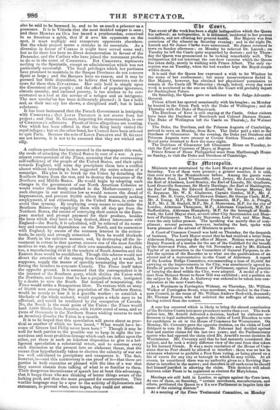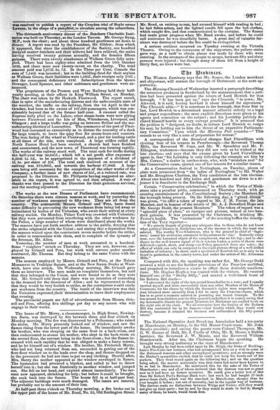Zbz ItIttropolis.
Ministers were entertained by the Lord Mayor at a grand dinner on Saturday. Ten of them were present ; a greater number, it is said, than ever met in the Mansionhouse before. Among the guests were. Sir Robert Peel, Lord Wharncliffe, Lord Jersey, Sir James Graham, the Earl of Aberdeen, Lord Stanley, the Earl of Lincoln, Mr. Goulburn, Lord Granville Somerset, Sir Henry Hardinge, the Earl of Haddington, the Earl of Ripon, Sir Edward Knatchbull, Sir George Murray, Sir G. Seymour, Mr. W. E. Gladstone, Captain Gordon, M.P., Mr. J. Somes, Mr. H. Corry, Colonel Dawson Darner, Sir George Clerk, M.P., Mr. J. Young, M.P., Sir Thomas Fremantle, M.P., Mr. A. Pringle, M.P., Mr. J. M. Gaskell, M.P., Mr. J. Masterman, M.P. for the city of London, Alderman Thompson, M.P., Alderman Copeland, M.P. for Staffordshire, Alderman Humphery, M.P. for the borough of South- wark, the Lord Mayor elect, several other City functionaries and Mem- bers of Parliament. The Lady Mayoress, Lady Peel, and Miss Best, were the only ladies present. The speaking was merely that of com- pliment : several persons, however, including the host, spoke with warm pleasure of the advent of Ministers to power.
A Court of Common Council was held on Thursday, for the despatch of business. The Lord Mayor stated that he had received a letter from Alderman Pixie, accepting the office of Mayor. Notices were given by Deputy Peacock of a motion for the use of the Guildhall for the benefit of the distressed Poles, after the 9th November ; and by Mr. Richard Taylor of an instruction to the Committee of General Purposes, to ob- tain the opinion of the Recorder as to what are the qualifications of an elector and of a representative loathe Court of Aldermen. A report of the London Bridge Committee, recommending a loan of 25,0001. for carrying on the improvements in the City, was unanimously agreed to. Drafts of petitions to both Houses of Parliament, against the practice of burying the dead within the City, were adopted. A model of a via- duct from Skinner Street to Snow Hill was exhibited ; and a petition on the subject by Mr. John A. Galloway was ordered to be taken into con- sideration at the next Court-day.
At a Wardmote in Farringdon Without, on Thursday, Mr. William Walker of Farringdon Street, wine-merchant, was elected to the Com- mon Council, in the room of Mr. William Andrew Beckwith, deceased; Mr. Thomas Pearce, who had solicited the suffrages of the electors, having retired from the contest.
A case has occurred which is likely to bring the absurd constitution of the Revision Courts into more prominent notice than ever. The week before last, Mr. Arnold delivered a decision, backed by elaborate re- ferences to legal authorities, against the claim of Lord Dinorben to vote for candidates to sit in the House of Commons for Westminster. On Monday, Mr. Coventry gave the opposite decision, on the claim of Lord Bridport to vote for Marylebone. Mr. Falconer had decided against that and similar claims for the last two years ; and the Parliamentary agents who had opposed the claim cited Mr. Arnold's recent decision in Westminster. Mr. Coventry said that he had maturely considered the subject, and he took a widely different view of the case from that taken by his learned friends. It was a mere resolution of the House of Com- mons that no Peer should be allowed to interfere : there was no law in existence whatever to prohibit a Peer from voting, or being placed on a list of voters for any city or borough in which he may reside. At all events, he considered there was no authority given to a Revising Bar- rister to interfere in the matter ; and therefore in all such cases he should feel himself justified in allowing the claim. This decision will admit fourteen other Peers to be registered as electors for Marylebone.
Meetings are still held in London to agitate against the Corn-laws. At one of them, on Saturday, " certain merchants, manufacturers, and others, petitioned the Queen to e ll a new Parliament to inquire into the cause of the existing distress."
At a meeting of the Times Testimonial Committee, on Monday
was resolved to publish a report of the Croydon trial of Boyle versus Lawson, in the shape of a pamphlet, to circulate among the subscribers.
The thirteenth anniversary dinner of the Butchers Charitable Insti- tution was held on Thursday, at the London Tavern. Mr. George Byng, M.P., took the chair ; and about three hundred gentlemen sat down to dinner. A report was read by the President, Mr. Giblett ; from which it appeared, that since the establishment of the Society, one hundred decayed master-butchers and their widows had been relieved, the males having received twenty guineas annually, and the females fifteen guineas. There were twenty almshouses at Walham Green fully occu- pied. There had been eighty-nine admitted from the 10th October 1838, and there were now twenty-seven on the charity. The total amount paid was 7,6751. 8s. 7d. In the Three per Cent. Consols the sum of 7,5401. was invested ; but in the building-fund for their asylum at Walham Green, their liabilities were 1,035L, their receipts only 2161. ; and the consequent deficiency 8191. Subscriptions from the Queen Dowager, Lord Spencer, and other noblemen and gentlemen were an- nounced.
The proprietors of the Preston and Wyre Railway held their half- yearly meeting, at their offices in King William Street, on Monday. The chair was taken by Sir Hesketh Fleetwood. The report stated, that in spite of the manufacturing distress and the unfavourable state of the weather, the traffic on the railway, from the 1st April to the 1st October, had been to the extent of 107,920 passengers, which was con- siderably beyond that of the former half-year. A steamer called the Express daily plied on the Lakes; other steam-boats were now plying between Fleetwood and the Isle of Man, Whitehaven, Liverpool, and Glasgow ; and a large traffic was going on between Belfast and the ma- nufacturing districts of Lancashire. The commerce of the port of Fleet- wood had increased so extensively as to dictate the necessity of a dock for large vessels, to leave the quay free for steam-boats and coasters. The iron facing of the wharf at Fleetwood, and a pier for landing cattle at all times of the tide, were completed. A large edifice called the North Euston Hotel had been erected, a church had been finished and consecrated, and the new town of Fleetwood was forming rapidly. The works of the railway stood well. The total cash for traffic during the half-year was 20,841/.; which left a net profit after expenses of 8,5041. Is. 5d., to be appropriated to the payment of a dividend of 11. 5s. per share of 25/. The total cash received on account of the railway was 310,0001., and towards the harbour 67,000/. A large sum being still necessary for the completion of the other works of the Company, a further issue of new shares of 251., at a reduced rate, was proposed b) the Directors. Mr. Phillpotts having suggested an alter- ation in the report, it was agreed to, and then adopted. A vote of thanks was then passed to the Directors for their gratuitous services, and the meeting adjourned.
The works at the new Houses of Parliament have recommenced. On Saturday there were sixteen masons at work, and by yesterday the number of workmen amounted to fifty-two. They are all from the country. The contractors, Messrs. Grissell and Peto, have found some difficulty in preventing the new workmen from being led away or intimidated by bodies of the Unionists, who await their arrival at every railway station. On Monday, Palace Yard was crowded with Unionists; but they were prevented from interfering with the other workmen by the Police, a large number of whom were distributed about the works. The masons have put forth another, address to the public, denying that the strike originated with the Union ; and stating that a deputation from the-masons waited upon the contractors seven months before the strike, in order to remonstrate with them, and to complain of the tyranny of the foreman, Mr. Allen.
Yesterday, the number of men at work amounted to a hundred. Some " roughers " struck on Thursday. They are not, however, em- ployed by Grissell and Peto, but work with carvers under another contractor, Mr. Thomas. But they belong to the same Union with the masons.
The masons employed by Messrs. Grissell and Peto, at the Nelson Monument in Trafalgar Square, and at the New Steam Docks at Wool- wich, have also struck. On Wednesday morning, Mr. Grissell gave them an interview. The men made no complaint themselves, but said that they belonged to the Union, and were bound to do as they were bid. Mr. Grissell told them that there was no intention of conceding to the demand for the dismissal of Allen ; and he represented to them that they would be very foolish to strike, as the contractors would easily get workmen from the country. The result of the interview was that the Unionists expressed-their determination to leave their employment that evening.
The provincial papers are fall of advertisements from Messrs. Gris- sell and Peto, offering five shillings per day to any mason who will engage in their works.
The house of Mr. Merry, a cheesemonger, in High Street, Newing- ton Butts, was destroyed by fire between three and four o'clock on Monday morning. The fire was discovered by a Policeman ; who raised the alarm. Mr. Merry presently looked out of window, and saw the flames rising from the lower part of the house. He immediately awoke his brother, who was sleeping on the same floor in a back-room, and then endeavoured to arouse his mother, who slept in the back-room on the second floor, the servant being in the front-room ; but the flames in- creased with such rapidity that he was obliged to make a hasty retreat, and he let himself out of a window. His brother, Mr. Frederick Merry, who had not long returned from sea, succeeded in getting out of the first-floor window on to the leads over the shop, and thence dropped on to the pavement: he had not time to put on any clothing. Shortly after, Mrs. Merry the mother appeared at the window enveloped in flames. The bystanders had procured a blanket, and called to her to throw herself into it ; but she ran frantically to another window, and jumped out She fell on her head, and expired almost immediately. The ser- vant now appeared, shrieking for help ; but before it could be brought, she sank back into the flames. The house fell in at half-past four. The adjacent buildings were much damaged. The losers are insured, but probably not to the amount of their loss.
At half-past three o'clock on Thursday morning, a fire broke out in the upper part of the house of Mr. Bond, No. 22, Old Burlington Street,
Mr. Bond, on retiring to rest, had amused himself with reading in bed ; he had fallen asleep, and the lighted candle fell upon the bed-clothes, which caught fire, and that communicated to the curtains. The flames had made great progress when Mr. Bond awoke, and before he could call assistance he was dreadfully burnt. A great deal of valuable fur- niture was destroyed before the fire could be extinguished.
A serious accident occurred on Tuesday evening at the Victoria Theatre. Owing to the rottenness of the supporters, the gallery-stairs gave way, as a rush' to obtain places was made by those who were entering. In the attempts of the people to escape, between fifty and sixty persons were injured ; but though many of them fell from a height of thirty feet, no lives were lost.



























 Previous page
Previous page